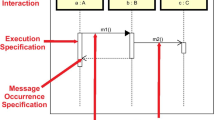Abstract
We describe an approach to automatically generate test cases from object-oriented statecharts as they are used in the UML and supported by development tools such as I-Logics Rhapsody.
This work contributes in three respects to using statecharts for specifying and verifying systems. First, it concretizes previously proposed semantics of statecharts by instantiating the abstract data type for the event management and analyzes the resulting specific properties. Second, building on a previously defined conformance relation it discusses two interpretations of stuttering. Third, it introduces a compact data structure for representing the statechart semantics that allows for efficient generation of test cases and easily supports both interpretations of stuttering.
Access this chapter
Tax calculation will be finalised at checkout
Purchases are for personal use only
Preview
Unable to display preview. Download preview PDF.
Similar content being viewed by others
References
Eshuis, R., Wieringa, R.: Requirements level semantics for UML statecharts. In: Proc. Formal Methods for Open Object-Based Distributed Systems, IV, Kluwer Academic Publishers, Dordrecht (2000)
Harel, D., Gery, E.: Executable object modeling with statecharts. In: Proc. 18th International Conference on Software Engineering, pp. 246–257 (1996)
Harel, D., Naamad, A.: The STATEMATE semantics of statecharts. ACM Transactions on Software Engineering and Methodology, 293–333 (1996)
Latella, D., Majzik, I., Massink, M.: Towards a formal operational semantics of UML statechart diagrams. In: Proc. Formal Methods for Open Object-Based Distributed Systems, III. Kluwer Academic Publishers, Dordrecht (1999)
Latella, D., Massink, M.: On Testing and Conformance Relations for UML Statechart Diagrams Behaviours. In: Proc. International Symposium on Software Testing and Analysis. ACM, New York (2002)
OMG – Object Management Group. Unified Modeling Language Specification, Version 1.3 (March 2000), http://www.omg.org
Seifert, D., Helke, S., Santen, T.: Conformance testing for statecharts. Technical Report 2003/1, Technical University of Berlin (2003)
Tretmans, J.: Test generation with inputs, outputs, and repetitive quiescence. In: Proc. Workshop on Tools and Algorithms for the Construction and Analysis of Systems, pp. 127–146. Springer, Heidelberg (1996)
Author information
Authors and Affiliations
Editor information
Editors and Affiliations
Rights and permissions
Copyright information
© 2004 Springer-Verlag Berlin Heidelberg
About this paper
Cite this paper
Seifert, D., Helke, S., Santen, T. (2004). Test Case Generation for UML Statecharts. In: Broy, M., Zamulin, A.V. (eds) Perspectives of System Informatics. PSI 2003. Lecture Notes in Computer Science, vol 2890. Springer, Berlin, Heidelberg. https://doi.org/10.1007/978-3-540-39866-0_46
Download citation
DOI: https://doi.org/10.1007/978-3-540-39866-0_46
Publisher Name: Springer, Berlin, Heidelberg
Print ISBN: 978-3-540-20813-6
Online ISBN: 978-3-540-39866-0
eBook Packages: Springer Book Archive




